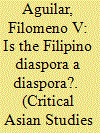| Srl | Item |
| 1 |
ID:
154249


|
|
|
|
|
| Summary/Abstract |
This article presents two modes of export-oriented sugar hacienda production in the late-nineteenth-century Spanish Philippines. The Hacienda de Calamba epitomised a large-scale estate under a religious corporation; it was an enclave economy reliant on local capital and technology. In contrast, Negros showcased a range of haciendas of varying sizes in a frontier setting involving different ethnicities and supported by capital and technology mediated directly by foreign merchant houses. In both locations sugar planters opposed the colonial state, but whereas leaseholders in Calamba, led by Rizal's family, became intentionally political in their resistance, in Negros planters engaged in a persistent and calibrated evasion of the state.
|
|
|
|
|
|
|
|
|
|
|
|
|
|
|
|
| 2 |
ID:
140255


|
|
|
|
|
| Summary/Abstract |
Despite the widespread popularity of the discourse on diasporas since the 1980s, the recognition of a Filipino diaspora in the wider Anglophone scholarly world did not occur until the mid 2000s. A major factor for this recognition was the considerable number of scholarly works on Filipino Americans produced largely by Filipino American scholars who used diaspora as theoretical frame starting in the late 1990s. Grappling with the realities of the global migrations of Filipinos, the Philippine state and Filipinos in the Philippines and in other parts of the world also began to deploy the diaspora discourse. This article analyzes the ways in which the discursive fields in the US and in the Philippines have converged or diverged. Although diaspora can be a problematic concept, the author examines methodological issues that focus not so much on identities but on the imagined and constructed collectivity within which the putative diasporan identity of Filipinos is embedded. Without reducing diaspora to a reifying checklist, the author explores the Filipino diaspora discourse along these five dimensions: (a) population dispersal from an original homeland, real or imagined; (b) a process of diasporization; (c) ongoing relationship with the homeland, nurtured by collective memory or mythology; (d) idealization of return to the homeland; and (e) self-awareness or collective consciousness that is intergenerational and interrelated to coethnics and compatriots within the diaspora.
|
|
|
|
|
|
|
|
|
|
|
|
|
|
|
|
| 3 |
ID:
134605


|
|
|
|
|
| Summary/Abstract |
In Southeast Asia the Philippines holds the distinction of reporting the highest number of murdered journalists between 1992 and 2012. This record makes the Philippines closer to countries in other parts of the world characterized as “transitional” democracies. These countries enjoy near full press freedom, but their institutional setting allows the perpetrators of crimes to evade accountability. The authors of this article argue that explaining these murders as due to state repression of progressive journalists in the Philippines ignores the complexity of these killings. This article shows that journalists murdered for their occupation (classified as “motive confirmed”) did not threaten the interests of the state as state but rather the interests of local power-holders. Thus, the killings of mass media practitioners need to be understood in the context of local-level contestations over positions and resources sanctioned by the state framework, particularly following the decentralization since 1991. Preliminary data analysis of journalist deaths from 1998 to 2012 and selected case studies suggest that these killings are primarily local events, mostly in provincial towns and cities.
|
|
|
|
|
|
|
|
|
|
|
|
|
|
|
|